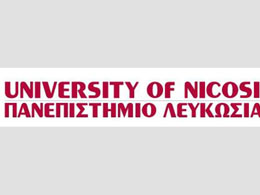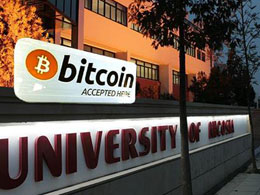
University of Nicosia Receives First Tuition Payment Using Bitcoin
A few days after the University of Nicosia ("UNic") announced that it is the first accredited university in the world to accept Bitcoin for payment of tuition and fees, a recently enrolled international student has made the first tuition payment to UNic using the popular digital currency. UNic is the largest private university in Cyprus and one of the largest English language universities in the Euro Mediterranean region.
On November 27, Francois Rossouw, a new UNic student in South Africa, made a payment of 1 BTC, the equivalent of EUR 670 ($910), toward tuition for an online Master of Business Administration degree.
"I am honored to be a part of this historical occasion. Being able to pay for a world-class tertiary education with Bitcoin was a dream of many but few believed that it would become a reality so soon," said Mr. Rossouw.
"I am not surprised that it was the University of Nicosia, with their history of trendsetting and innovation who took the first step. I commend them on breaking the shackles of traditional payment barriers."
"This is exactly what we expected, that initial adoption would occur from students who are attending our online degree programs from certain countries in Africa. In some countries, international payments are extremely cumbersome and given that certain students pay on a monthly installment plan, transmission fees end up reaching 5 to 10 percent of their payments and are highly inconvenient," said Dr. Christos Vlachos, member of the Council of the University of Nicosia and the University's Chief Financial Officer.
"The intention of this initiative is to ease transmission difficulties and to build our own practical knowledge about this field."
In addition to accepting Bitcoin, UNic is also launching the first Master of Science Degree in Digital Currency in Spring 2014.
"I am convinced that it is this attitude that will attract some of the brightest minds in the Bitcoin world to study at the University of Nicosia especially with their Master's program in Digital Currency, another global first," continued Mr. Rossouw.
"The payment made to UNic for my tuition was instant, borderless and seamless. The UNic staff was incredibly helpful in their correspondence and making sure all my questions were answered swiftly. I look forward to seeing this institution continue to grow as a hub of innovation firsthand."
As part of its broader Digital Currency Initiative, UNic is also proposing to the Cyprus Government and the relevant stakeholders the initiation of a comprehensive framework for developing Cyprus into a hub for Bitcoin trading, processing and banking.
To learn more about the UNic Digital Currency Initiative, to request more information about enrollment in the new MSc. in Digital Currency Program or to register for future announcements, visit: http://www.unic.ac.cy/digitalcurrency/
About the University of Nicosia
The University of Nicosia is the largest private university in Cyprus and one of the largest accredited English language universities in the Euro-Mediterranean region. It offers more than 60 degree programs from the bachelor's to doctoral levels, and is a particular leader in the fields of accounting, business, computer science, law, architecture, engineering, psychology, medicine and international relations. For more than 20 years, the University has published its own academic journal, the Cyprus Review, which is the only English language international academic journal in Cyprus.
Currently more than 8,500 students from all over the world attend a program at the University of Nicosia or affiliated institutions (such as St. George's University of London/UNic Medical School, a partnership between St. George's University of London and UNic; Intercollege, vocational colleges in Nicosia, Limassol and Larnaca; Globaltraining, professional training division with campuses in Cyprus, Greece and Romania; Erasmus and Global Semesters exchange and study abroad programs, and UNic Online, offering online programs to students worldwide).
The language of instruction for most University of Nicosia programs is English.
To learn more about the University of Nicosia, please visit: http://www.unic.ac.cy/
Related News




